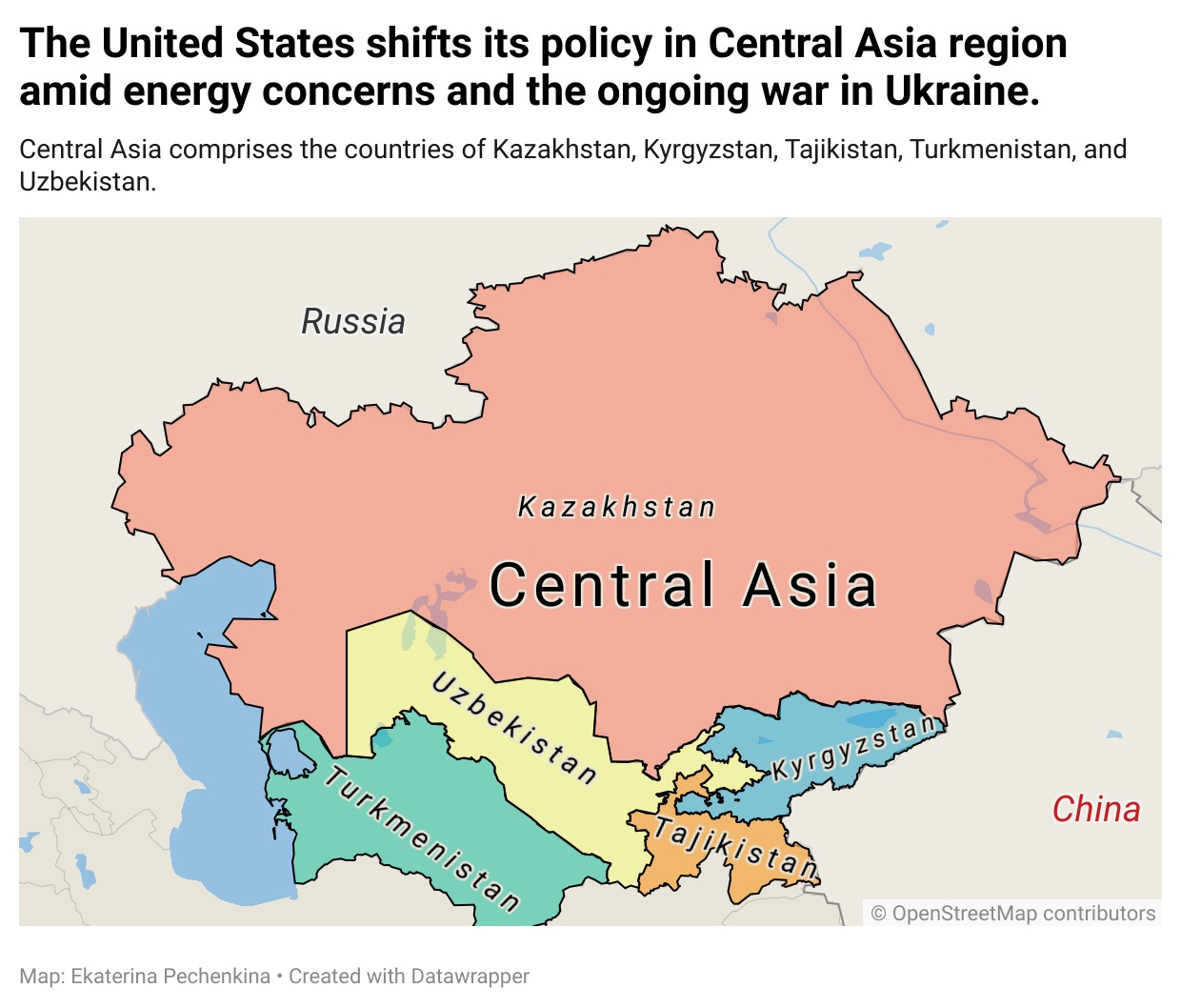WASHINGTON – Secretary of State Antony Blinken plans to meet next week with his Central Asian counterparts at the United Nations, a signal of a new focus on the region prompted by the war in Ukraine and concerns over future energy sources.
The Central Asian countries – Kazakhstan, Kyrgyzstan, Tajikistan, Turkmenistan, and Uzbekistan – are the middle ground between China to the east, Russia to the north and Caspian sea to the west. The region has been in the headlines lately, getting – with special attention from China’s President Xi Jinping and Russian President Vladimir Putin, who both met with several of the region’s leaders while visiting Samarkand, Uzbekistan.
All five nations were once part of the former Soviet Union.
The war in Ukraine forced the Biden administration recalibrate its relations with Russia, and also made the nation’s interests in strengthening relations with Central Asia more relevant, according to Donald Lu, assistant secretary of state for South and Central Asian affairs and former U.S. ambassador to Kyrgyzstan.
 He said U.S. priorities include guaranteeing territorial integrity, boosting existing trade and establishing permanent trade, as well as addressing counterterrorism and other security concerns.
He said U.S. priorities include guaranteeing territorial integrity, boosting existing trade and establishing permanent trade, as well as addressing counterterrorism and other security concerns.
“This is a defining moment for the people of Central Asia,” Lu told lawmakers at a hearing Wednesday of the House Foreign Affairs Committee’s Asia, the Pacific, Central Asia and nonproliferation subcommittee. “Russia’s war of aggression in Ukraine has created concerns about sovereignty and territorial integrity in this neighboring region.”
While Moscow’s and Beijing’s presence in the region has been undeniably substantial, when it comes to the U.S. involvement, Central Asia has gotten “less attention than deserved,” Rep. Steve Chabot of Ohio, the top Republican on the subcommittee.
According to the State Department’s current U.S. strategy for Central Asia, the region is “a geostrategic region important to United States national security interests, regardless of the level of United States involvement in Afghanistan.”
But Dr. Sebastien Peyrouse, Central Asia Program research professor at The George Washington University’s Elliott School of International Affairs, remains skeptical of U.S. geopolitical ambitions in the region.
“I’ve heard for years and years the U.S was going to be more involved in the region without actually materializing it,” Peyrouse told Capital News Service in an interview.
“Central Asia is definitely not a priority for the United States,” Peyrouse said. “Now, again, we have Ukraine, and considering that, the U.S. has an opportunity to be more involved.”
Peyrouse emphasized that the United States and the European Union need to stop focusing solely on the region’s economies and security, and start paying more attention to high levels of corruption, socio-economic difficulties of the people in the region, as well as their deficient education and healthcare systems.
“If the United States really wants to counterbalance the influence of China and Russia, the U.S. needs to improve its image there,” Peyrouse said.
The United States is involved in discussions about transporting oil from Kazakhstan to international markets, as well as the possibility of getting natural gas out of Turkmenistan through the southern corridor into Europe, according to Lu.
The Jackson Vanik amendment to the 1974 Trade Act, which prohibits normal trade relations with any nation that prohibits the emigration of its people, is a roadblock to expanding U.S. trade with Central Asia. Lu said that the State Department supports ending the application of those restrictions against Kazakhstan, Uzbekistan and Tajikistan because those nations have met the requirements of the Jackson Vanik amendment.
“As the United States engages in great power competition with the People’s Republic of China and its partners in despotism – Iran and Russia, Central Asia is poised to be of critical importance in the years ahead,” Chabot said.


You must be logged in to post a comment.